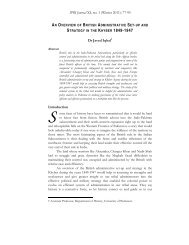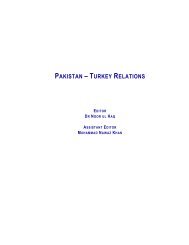120 Whither Kashmir? (Part II) - Islamabad Policy Research Institute
120 Whither Kashmir? (Part II) - Islamabad Policy Research Institute
120 Whither Kashmir? (Part II) - Islamabad Policy Research Institute
Create successful ePaper yourself
Turn your PDF publications into a flip-book with our unique Google optimized e-Paper software.
52 IPRI Factfile<br />
his Pakistani counterpart in front of the media that her mandate was “to<br />
tell you that the territory of Pakistan must not be used for terrorism.”<br />
Pakistan, on the other hand, called for the recommencement of the<br />
composite dialogue and stressed that the issue of terrorism should not be<br />
allowed to make bilateral talks a hostage. The Pakistani side also called<br />
for a peaceful solution of the <strong>Kashmir</strong> issue, besides conveying to India its<br />
concerns over Indian activities aimed at supplying weapons to militants<br />
and terrorists in Balochistan from Afghanistan. Pakistan also handed over<br />
to India a paper on the water issue and expressed the hope that India<br />
would agree to resolve the issue under the Indus Basin Waters Treaty. As<br />
for the issue of terrorism, Salman Bashir pointed out to the media that<br />
Pakistan had already taken steps against the suspects of Mumbai attacks<br />
and would look into the dossiers handed over by India during the talks.<br />
The net result of the foreign secretary-level talks was merely the<br />
agreement to remain in touch with each other. The position remained<br />
unchanged even after Salman Bashir’s courtesy call on the Indian Foreign<br />
Minister Krishna who remarked that future engagement with Pakistan<br />
would be “predicated on Pakistan’s response to our core concern on<br />
terrorism.” This was not entirely surprising considering the high level of<br />
anti-Pakistan sentiment in India, especially after the Mumbai tragedy, and<br />
the criticism by some Indian opposition leaders of New Delhi’s move to<br />
invite the Pakistani foreign secretary for talks. It was a measure of the<br />
gulf between the two sides that the Pakistani foreign secretary did not<br />
invite his Indian counterpart for a return visit to <strong>Islamabad</strong>. In fact, he<br />
remarked after the talks that there was no need for secretary-level talks if<br />
India remained stuck to its stand on outstanding issues. The best<br />
interpretation that can be given is that the talks in New Delhi were<br />
exploratory in nature aimed at gauging each other’s position and that<br />
they marked the first step towards a gradual process of rebuilding mutual<br />
trust leading hopefully to the resumption of the composite dialogue.<br />
Obviously, the next SAARC Summit in Bhutan in April would provide a<br />
valuable opportunity to the prime ministers of Pakistan and India to<br />
carry forward the process of bilateral talks. But in view of the many ifs<br />
and buts involved, it is anybody’s guess as to the timeframe in which<br />
substantive dialogue on the outstanding issues of concern to the two sides<br />
would be resumed.<br />
The future prospects of Pakistan-India relations remain uncertain<br />
considering the high level of mutual mistrust, the historical baggage of<br />
mutual grievances, the complexity of the outstanding issues like <strong>Kashmir</strong>




